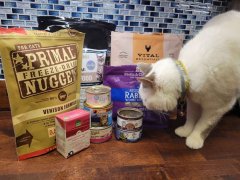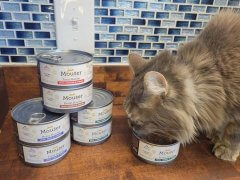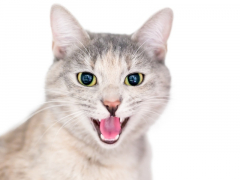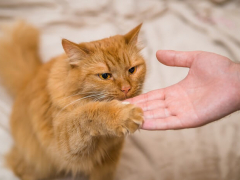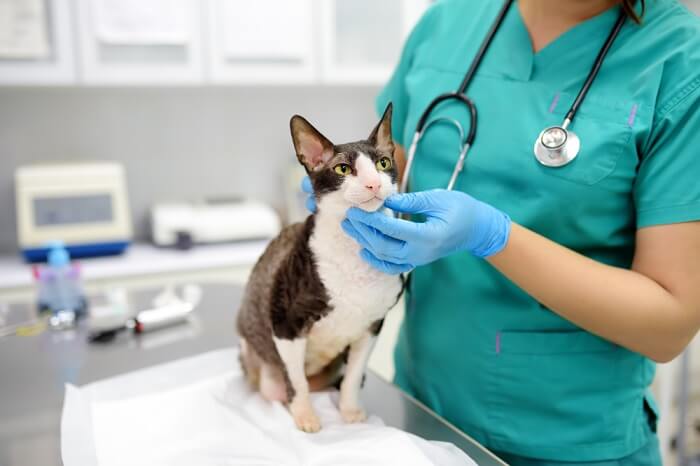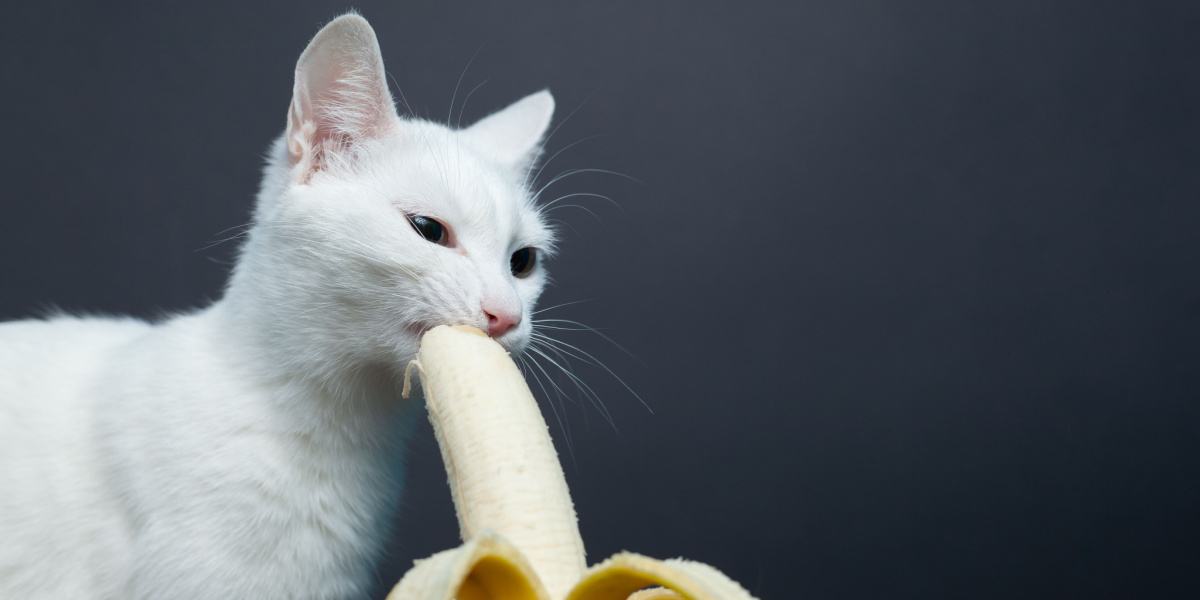
Cats are carnivores, so they primarily obtain their nutrients from eating the meat from other animals, like chicken or beef.
However, bananas are tasty, filling, and full of nutrition for us humans, including fibre and potassium. Sounds perfect for your feline friend, doesn’t it?
However, are bananas as good for cats as they are for us humans?
It is safe to feed your cat bananas in small portions, too much banana can cause obesity and constipation.Quick Overview: Can Cats Eat Bananas





Summary of Content
Can Cats Eat Banana?
Bananas are not on the list of foods that are toxic to cats, so they are safe for your cat to eat in moderation. Remember, bananas are high in sugar, calories, and fiber, so your cat may show no interest in tasting a banana should they have no interest in sweet foods.
What Are the Benefits for Cats That Eat Banana?
Should they like the taste of banana, then there are some good health benefits for our cat, although our cats would need to eat more than what is advisable to boost their health.
This does not mean that banana is not healthy for cats, but do not expect a huge nutritional benefit. However, there are nutrients that can be beneficial to your cat.
Potassium
Bananas are rich in potassium. This is the nutrient that helps support heart and kidney health. Potassium can be essential for senior cats as more mature cats have a weaker heart and can suffer from chronic renal failure as they get older.
Feeding your cat extra potassium is a balancing act. Firstly, a good feed should have the right balance of vitamins and minerals that your cat needs.
Potassium intake for the day should only be 0.6% of a cat’s daily diet, however, should you feel that extra potassium is required, then you should seek veterinary advice.
If your cat’s blood potassium is low, it will develop hypokalemia. This means that there is a low level of potassium in the blood. In mild cases you would not normally notice that potassium levels are low.
Low potassium in the blood can advance kidney failure, with your cat showing a reduced appetite and their limbs may become weak or appear stiff when moving. Occasional feeding of bananas, in appropriate doses, could potentially help, but please always seek advice from your veterinary surgeon, prior to changing their diet.
Vitamin B6
The Vitamin B6 found in bananas can be a great boost for older cats. Vitamin B6 is particularly important for kidney function and is removed in urine throughout the day. so, must be replaced.
Do not rely on bananas for vitamin B6, as a cat will need to eat more banana than is safe, to get a full, required dosage. It makes a helpful supplementation should your cat also enjoys the taste.
Manganese
A trace element found in bananas is manganese. Manganese can be beneficial to the skin as it encourages the creation of collagen. This can be imperative for senior cats, as older felines have weak skin and can be suffering with scabs and sores on the body and head.
Cats require a little manganese to meet their daily needs, but a deficiency is rare. There is no harm in adding banana to the diet, so a small slice of banana will add more manganese to a cat’s diet.
Digestive Health
Banana is high in fiber, which can cause diarrhea if given in large amounts.
Should your cat become constipated, banana can be beneficial. Using a small amount of mashed banana with a little water and (either) mixed with food or served separately, can aid in constipation. Ensure your cat has access to the litter tray or be able to make it outside.
Are There Any Negatives To Feeding Cats Banana?
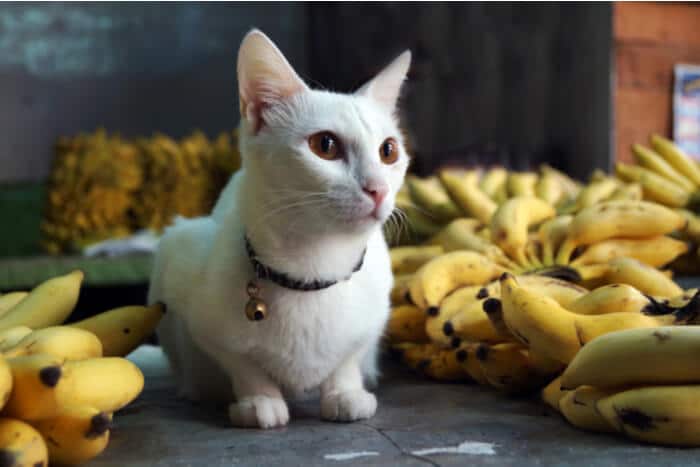
While not toxic to cats, feeding cats bananas may lead to negative health consequences. They are very high in sugar, which could lead to obesity, arthritis, and other conditions.
As mentioned, bananas are not toxic to cats, and although there are many advantages to feeding your cat banana, there are also several negatives, these include:
Sugar
The average banana contains around 17g of naturally occurring sugar, feeding your cat too much sugar-based food could lead to obesity, ultimately resulting in an unnecessary strain on the joints and potentially arthritis – this is normally seen in older cats but it can develop in younger cats too.
If you notice that your cat is carrying a little more weight than they should be, then your cat’s calorie intake must be reviewed.
Obesity leads to a heightened risk of feline diabetes. Normally, the more weight the cat carries, then it can lead to diabetes and other health issues too.
Finally, too much sugar can have an impact on your cat’s teeth. Dental disease is a common problem in older cats. A low-sugar diet reduces the chances of your cat’s teeth developing plaque.
Fiber
Fiber helps the digestive tract to manage food and pass it as healthy waste. Bananas are high in fiber so, in theory, they are a great feline treat. However, in practice, it is easy for a cat to have too much.
A cat that is fed a high-quality, balanced diet will receive all the fiber it needs, but adding an excessive amount of this food group can cause digestive upset, resulting in the likelihood of diarrhea and dehydration in your cat, if left untreated.
It takes a cat a long time to process fiber. Positively, your cat will feel fuller for longer so will not bother you for extra food or treats. Negatively, the digestion is much slower and could leave your cat feeling bloated.
Carbohydrates
Much like fiber, carbohydrates are one of the major food groups. In cats though, carbohydrates are not really needed. A cat that has too many carbohydrates is consuming extra calories which, if not burnt, can cause obesity.
Also Read: Cat Obesity Chart: Find Out if Your Cat is Obese
How to Safely Give Your Cat Banana?
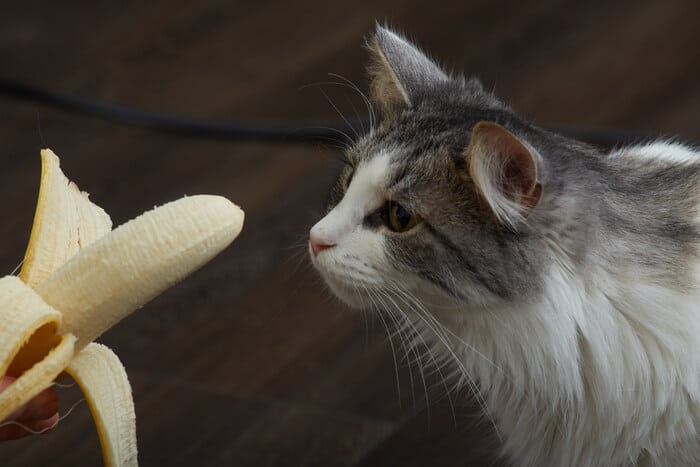
If your cat is interested in bananas, you can give them a small amount on occasion.
It is safe to feed your cat banana but be careful when feeding new foods to your cat.
You should always give a small piece first to see if your cat likes banana or not. Offering a small piece will show you if the cat can tolerate the food and not cause an upset stomach.
Never feed your cat mouldy bananas, as these may cause digestive upset. Never give your cat the peel either – it is tough to chew and even if they do manage to chew a small piece then this could easily become a choking hazard.
Also, watch out for allergy symptoms.
Should your cat display any of these warning signs after eating banana, you must stop feeding it immediately and contact your veterinary surgeon:
Frequently Asked Questions
How much banana can I give my cat?
Should your cat tolerate bananas, ensure that you limit them to a safe level.
Bananas should make up no more than 10% of a cat’s daily food allowance. Any more than this risks stomach issues and weight gain.
If you decide to offer your cat banana, you also need to consider how. Fresh banana can be offered when sliced. A maximum of two slices per day is recommended.
What happens if a cat eats a banana?
Bananas are a good food for our cats, especially senior cats for their kidneys and to help with constipation. Too much banana can cause obesity problems, so remember, everything in moderation.
Can cats eat banana every day?
Introduce banana to your cats’ diet gradually, meaning an exceedingly small amount at a time. This will show you if your cat will tolerate the banana and not cause any digestive upset. There are many ways which you can offer your cat (a small amount of) banana. Try freezing slices of banana and dilute with water before serving. This will make the banana moist and much easier to digest.
Can I give my cat too much banana?
Any food has the potential to make your cat unwell, if eaten to excess. It is also important to remember that cats can be allergic to any kind of food. In general, bananas are considered safe but should only be given as an occasional treat and should not make up the core of a cat’s diet. If banana causes an upset stomach for your cat or your cat seems unwell after eating a banana then you should seek advice from your veterinary surgeon.


